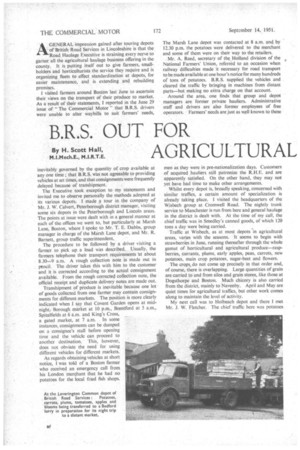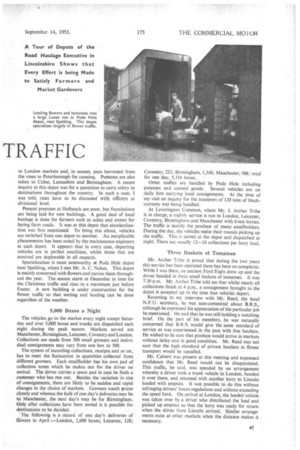B.R.S. OUT FOR AGRICULTURAL TRAFFIC
Page 40

Page 41

If you've noticed an error in this article please click here to report it so we can fix it.
AGENERAL impression gained after touring depots of British Road Services in Lincolnshire is that the Road Haulage Executive is straining every nerve to garner all the agricultural haulage business offering in the county. It is putting itself out to give farmers, smallholders and horticulturists the service they require and is organizing fleets to effect standardization at depots; for easier maintenance, and is extending and rebuilding premises.
I visited farmers around Boston last June to ascertain their views on the transport of their produce to market. As a result of their statements, I reported in the June 29 issue of "The Commercial Motor" that B.R.S. drivers were unable to alter waybills to suit farmers' needs, inevitably governed by the quantity of crop available at any one time ; that B.R.S. Was not agreeable to providing vehicles at set times, and that consignments were frequently delayed because of transhipment.
The Executive took exception to my statements and invited me to observe personally the methods adopted at its various depots. I made a tour in the company of Mr. J. W. Calvert, Peterborough district manager, visiting some six depots in the Peterborough and Lincoln areas. The points at issue were dealt with in a general manner at each of the offices we went to, but particularly at Marsh Lane, Boston, where I spoke to Mr. T. E. Dabbs, group manager in charge of the Marsh Lane depot, and Mr. R. Barnett, group traffic superintendent.
The procedure to be followed by a driver visiting a farmer to pick up a load was described. Usually, the farmers telephone their transport requirements ht about 8.30-9 a.m. A rough collection note is made out in pencil. The driver takes this with him to the customer and it is corrected according to the actual consignment available. From the rough corrected collection note, the official receipt and duplicate delivery notes are made out.
Transhipment of produce is inevitable because one lot• of goods collected from one farmer may contain consignments for different markets. The position is more clearly indicated when I say that Covent Garden opens at midnight, Borough market at 10 p.m., Brentford at 5 a.m„ Spitalfields at 6 a.m. and King's Cross, a gated market, at 7 a.m. In some instances, consignments can be dumped on a consignee's stall before opening time and the vehicle can proceed to another destination. This, however, does not obviate the need for using different vehicles for different markets. As regards obtaining vehicles at short notice, I was told of a Boston farmer who received an emergency call from his London merchant that he had no potatoes for the local fried fish shops. The Marsh Lane depot was contacted at 8 a.m. and by 12.30 p.m. the potatoes were delivered to the merchant and some of them were on their way to the retailers.
Mr. A. Reed, secretary of the Holland division of the National Farmers' Union, referred to an occasion when railway difficulties made it necessary for road transport to be made available at one hour's notice for many hundreds of tons of potatoes. B.R.S. supplied the vehicles and cleared the traffic by bringing in machines from distant parts—but making no extra charge on that account.
Around the area, one finds that group and depot managers are former private hauliers. Administrative staff and drivers are also former employees of free operators. Farmers' needs are just as w.ell known to these men as they were in pre-nationalization days. Customers of acquired hauliers still patronize the R.H.E. and are apparently satisfied. On the other hand, they may not yet have had time to make other arrangements.
Whilst every depot is, broadly speaking, concerned with similar traffics, a certain amount of specialization is already taking place. I visited the headquarters of the Wisbech group at Cromwell Road. The nightly trunk service to Manchester is run from here and general haulage in the district is dealt with. At the time of my call, the chief traffic was in Smedley's canned goods, of which 120 tons a day were being carried.
Traffic at Wisbech, as at most depots in agricultural areas, varies with the seasons. It seems to begin with strawberries in June, running thereafter through the whole gamut of horticultural and agricultural produce—raspberries, currants, plums, early apples, peas, carrots, new potatoes, main crop potatoes, sugar-beet and flowers.
The crops, do not come up precisely in that order and, of course, there is overlapping. Large quantities of grain are carried to and from silos and grain stores, like those at Dogsthorpe and Boston. Much chicory is also carried from the district, mainly to Navenby. April and May are quiet times for agricultural traffics, but other work comes along to maintain the level of activity.
My next call was to Holbeach depot and there I met Mr. J. W. Fletcher. The chief traffic here was potatoes
to London markets and, in season, peas harvested from the vines to Peterborough for canning. Potatoes are also taken to Collie, Lancashire and Birmingham. A recent inquiry at this depot was for a quotation to carry celery to destinations throughout the country. In such a case, I was told, rates have to be discussed with officers at divisional level.
Present premises at Holbeach are poor, but foundations are being laid for new buildings. A good deal of local haulage is done for farmers such as ashes and stones for laying farm roads. It was at this depot that standardization was first mentioned. To bring this about, vehicles are switched from one depot to another. An inexplicable phenomenon has been noted by the maintenance engineers at each depot. It appears that in every case, departing vehicles are in perfect condition, whilst those that are received are deplorable in all respects.
Specialization is most noteworthy at Pode Hole depot near Spalding, where I met Mr. A. C. Nokes. This depot is mainly concerned with flowers and carries them throughout the year. The season starts in December in time for the Christmas traffic and rises to a maximum just before Easter. A new building is under construction for the flower traffic so that sorting and loading can be done regardless of the weather.
5,000 Boxes a Night The vehicles go to the market every night except Saturday and over 5,000 boxes and trunks are dispatched each night during the peak season. Markets served are Manchester, Birmingham, Leicester, Coventry and London. Collections are made from 500 small growers and individual consignments may vary from one box to 500.
The system of recording collections, receipts and so on, has to meet the fluctuation in quantities collected from different growers. Each smallholder has his own pad of collection notes which he makes out for the driver on arrival. The driver carries a spare pad in case he finds a customer who has run out. Besides the variation in size of consignments, there are likely to be sudden and rapid changes in the choice of markets. Growers watch prices closely and whereas the bulk of one day's deliveries may be to Manchester, the next day's may be for Birmingham. Only after collections have been sorted is it possible for destinations to be decided.
The following is a record of one day's deliveries of flowers in April ;—London, 2,600 boxes; Leicester, 128;
Coventry, 252; Birmingham, 1,348; Manchester, 988; total
for one day, 5,316 boxes:. •
Other traffics are handled by Pode Hole including potatoes and canned goods. Several vehicles are on daily hire carrying local consignments. At the time of my visit an inquiry for the transport of 120 tons of blackcurrants was being handled.
At Leverington Common, where Mr, J. Archer Tribe is in charge, a nightly service is run to London, Leicester, Coventry, Birmingham and Manchester with 6-ton lorries. The traffic is mainly the produce of _many smallholders. During the day, the vehicles make their rounds picking up the traffic. This is sorted at the depot and dispatched at night. There are usually 12-16 collections per lorry load.
Three Baskets of Tomatoes
Mr. Archer Tribe is proud that during the two years this service has been operated there has been no complaint. While I was there, an ancient Ford Eight drew up and the driver handed in three small baskets of tomatoes. It was 7.30 p.m. Mr. Archer Tribe told me that whilst nearly all collections finish at 4 p.m., a consignment brought to the depot is accepted up to the time that vehicles depart.
Reverting to my interview with Mr. Reed, the local secretary, he was non-committal about B.R.S., although he expressed his appreciation of the particular job he mentioned. He said that he was still holding a watching brief. On the part of his members, he was naturally concerned that B.R.S. would give the same standard of service as was experienced in the past with free hauliers. He wished to be sure that produce would arrive in markets without delay and in good condition. Mr. Reed was not sure that the high standard of private hauliers in flower transport would be equalled.
Mr. Calvert was present at this meeting and expressed confidence that Mr. Reed would not be disappointed. This traffic, he said, was speeded by an arrangement whereby a driver took a trunk vehicle to London, handed it over there, and returned with another lorry to Lincoln loaded with empties. It was possible to do this without infringing drivers' hours regulations and without exceeding the speed limit, On arrival at London, the loaded vehicle was taken over by a driver who distributed the load and picked up empties so that the lorry was ready for return when the driver from Lincoln arriyecl,: Similar arrangements exist at other markets when the distance makes it necessary.




















































































